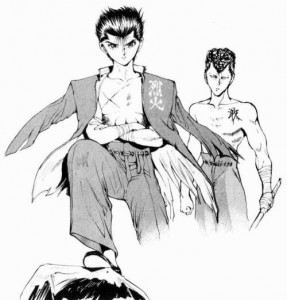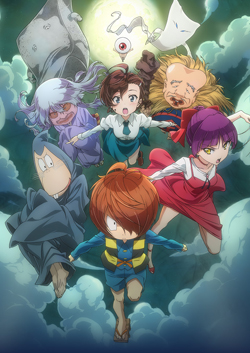 My fiance and I have gotten into the practice of watching episode after episode of Hunter x Hunter in the evenings, and the show has gotten me thinking a lot about Yoshihiro Togashi’s other major manga-turned-anime, Yu Yu Hakusho. To my mind, both series are really well-crafted, but each has their strengths and weaknesses, especially when compared to one another.
My fiance and I have gotten into the practice of watching episode after episode of Hunter x Hunter in the evenings, and the show has gotten me thinking a lot about Yoshihiro Togashi’s other major manga-turned-anime, Yu Yu Hakusho. To my mind, both series are really well-crafted, but each has their strengths and weaknesses, especially when compared to one another.
Yu Yu Hakusho was Togashi’s first major hit manga, first released in 1990 and running until 1994. After marrying Sailor Moon‘s mangaka Naoko Takeuchi, Togashi went on to publish Hunter x Hunter in 1998. The manga is currently ongoing. Just looking at the run dates, it’s obvious that Hunter x Hunter is the more commercially successful of the two, but I would argue that that doesn’t make it automatically superior in terms of quality. (Additionally, Togashi actually called for the end of YYH, according to Wikipedia, because he was suffering health issues resulting from lack of sleep.)

I’d like to preface this by saying that I’m really enjoying Hunter x Hunter, and that any bias I show toward Yu Yu Hakusho is at least partially because I grew up watching the (absolutely stellar) dub. I do believe that HxH‘s commercial success has greatly overshadowed any hope of popularity for YYH, but I also genuinely believe that Togashi grew very much as a mangaka between the two series, so there is good reason for that trend, as well.
HxH is very much intended to appeal to a younger audience, from what I can tell. Despite the excruciating violence of the third season (which centers around a supporting character), the protagonist, Gon, is an extremely innocent twelve-year-old whose sole mission is to become a Hunter to find his absentee Hunter-father. His companions include a child assassin, a massacre survivor, and a doctor-in-training, and though the battles and subject matter can be very grim, there is a very shonen-protagonist air about Gon; he is always in the moral right, he believes in goodness, and he values friendship. Naturally, this is very appealing to an audience who is accustomed to such protagonists: Yugi from Yu-Gi-Oh!, Goku from Dragonball, Ash/Satoshi from Pokemon.
Yusuke, the protagonist of YYH, is the polar opposite. He’s slightly older than Gon, starting out as a fifteen-year-old delinquent with an alcoholic mother who misses school regularly and picks fights to the extent that he is revered as the best fighter in town. He dies almost immediately in the first episode, after saving a small boy from being hit by a car. Because his time was not up yet, he has to return to life to become a detective for the spirit world. And though the story progresses with Yusuke regularly being in the moral right, he, as a character, is very honest to his original personality: mouthy, angry, and always happy to beat down some bad guys. Truly, Yusuke is a yankee with a heart of gold, which means that I already prefer him as a protagonist over Gon. And though his personality remains the same, he definitely grows significantly over the three years that the story takes place, learning to be more honest with his feelings and with his friends and almost being good despite himself.
Protagonists aside, I think that HxH‘s story is better crafted. This is the first series I’ve seen where the time line is pretty strictly adhered to in a way that makes sense, for starters. We are also given a good deal of background about two of the three supporting characters, Killua and Kurapika, who get major arcs and intense battles all to themselves. Unfortunately, the series also has an annoying tendency to entirely drop the supporting characters for seasons at a time, which can be tedious because of Gon’s steadfast attitude and lack of emotional growth.
On the other hand, YYH is really great about keeping the gang more or less all together; however, certain arcs (the Dark Tournament) go on far beyond their usefulness, in keeping with shonen anime traditions of the 1990s. We don’t get as much background information about the supporting characters as we do in HxH, which is a real shame because Kurama, Hiei, and Kuwabara are all fascinating, and extremely diverse, personalities.

HxH does have the upper hand in interesting female characters, as well. Even though Keiko, Botan, Shizuru, Genkai, and Atsuko of YYH are varied and active in the plot, they function mainly as cheerleaders or anchors and don’t have very much in the way of background or character growth. One of my favorite aspects of HxH is the character Melody/Senritsu. She is a Music Hunter who is able to hear things from a great distance, and who can calm people by playing her flute. Pretty average character in that respect, but she was also once exposed to a cursed song that caused her to become ugly and misshapen. She is the first ugly sympathetic character I’ve ever, ever seen in anime, and she is absolutely lovely to everyone, taking special care of Kurapika when his tendency to overextend himself gets the better of him.
 In addition to Melody, there is a host of physically or emotionally strong female characters present in HxH, many of whom are villains. In fact, many of the villains, though certainly morally reprehensible people on the whole, are fully fleshed out characters with whom the audience can sympathize. Togashi does attempt this kind of sympathy for the devil in YYH as well, with the character of Toguro, but his background is not nearly as fleshed out.
In addition to Melody, there is a host of physically or emotionally strong female characters present in HxH, many of whom are villains. In fact, many of the villains, though certainly morally reprehensible people on the whole, are fully fleshed out characters with whom the audience can sympathize. Togashi does attempt this kind of sympathy for the devil in YYH as well, with the character of Toguro, but his background is not nearly as fleshed out.
On the whole, Hunter x Hunter certainly benefits from having been a later work in Yoshihiro Togashi’s repertoire. Whether be from inexperience or stress or lack of ideas, Yu Yu Hakusho was only ever fated to be a really good beginning for the mangaka’s later success. I will probably always prefer YYH to its successor, partially out of nostalgia and partially out of a personal need to have a realistic protagonist. However, I can concede that it merely planted the seeds for a series that would finally display Togashi’s true sensibilities as a creator of shonen storytelling.











The old Hunter X Hunter was aimed at the younger crowd. The new Hunter X Hunter is meant to draw that, now older, fan base back. I think because of Gon’s age, it lulls the viewer into thinking it’s something else at times, but it always goes dark. What makes the show unique is its world is adult and its perspective is often through children.
Well, the old anime series diverged a lot more from the source manga than the current anime series. The fact of the matter remains that the laws in Japan regarding censorship for childrens’ material is far more lax than in the States; when the manga was translated into English, Shonen Jump decided to put it into Jump Advanced, geared toward older teens instead of their regular 13+ crowd. Of course, Shonen Jump in Japan has a much younger readership, or a larger age range anyway, because of the aforementioned lack of strict violence censorship.